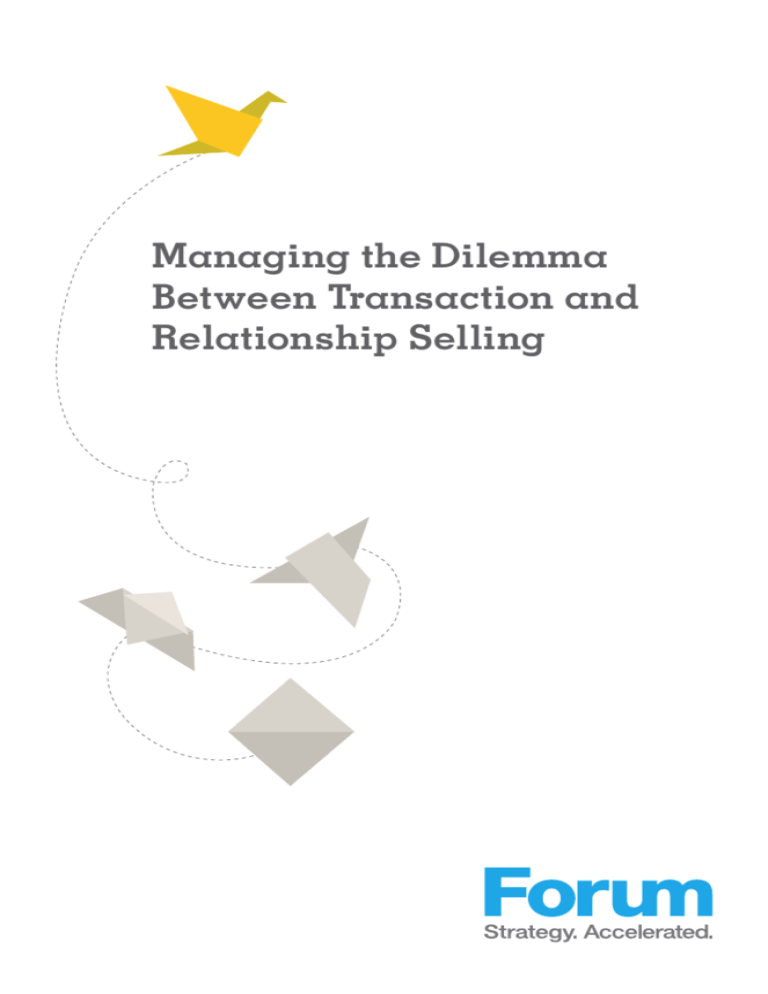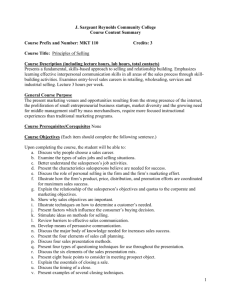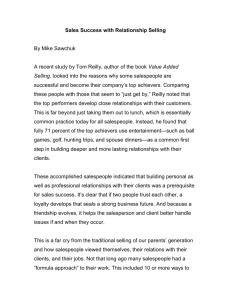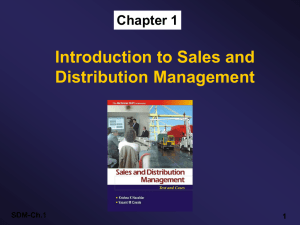
Managing the Dilemma
Between Transaction and
Relationship Selling
Managing the Dilemma
Xavier Martin, Ph.D.: Background
Xavier Martin holds a Ph.D. in Sales Management from ESSEC Paris, where he teaches
Management. A partner of the Forum Corporation, he is the founder of PhormAction
SARL (a training company working all over EMEA that helps organizations dare to
dream about creating a more productive business environment in which people develop
themselves). With more than 20 years experience in training and coaching in the areas
of sales, management, and leadership, Xavier recently defended his doctoral thesis,
“The Two Orientations of the Sales Force Control System: Impact on Short-Term
and Long-Term Performance.” He shares some of his insights and experience in this
interview with The Forum Corporation:
Forum: What trends have you seen in the sales
arena that specifically impact sales management?
Xavier: One of the dilemmas facing sales
organizations is the tension between short-term,
transactional selling and medium- or long-term
selling, focused on building client relationships.
This is putting a tremendous pressure on both
salespeople and sales managers.
“
Salespeople tend to
gravitate to certain
types of customers
based on whether they
(the salespeople) are
“hunters” or “farmers,”
for example.
Forum: What are some of the factors that contribute to this dilemma?
Xavier: There are many. First, sales managers must understand a constantly changing
context: the market conditions, the pace of change, and the global nature of the market.
Then, they must balance their organization’s “quarterly focus” on one end with creating
long-term sustainable relationships on the other. (An example of this phenomenon is the
evolution from selling products to selling solutions.) The third factor is understanding
what customers value in the buying process. (Do they value a transactional relationship
or partnership relationship?) The last factor is understanding salespeople’s skills and
natural tendencies. Salespeople tend to gravitate to certain types of customers based
on whether they (the salespeople) are “hunters” or “farmers,” for example. If they are
hunters, they will look for a more transactional customer—and then, once they’ve found
one, move quickly on to the next one. Farmers will take the time to nurture and develop
long-term relationships with their customers. Sales managers need to consider who is on
their team—hunters or farmers—and ensure that salespeople are adapting to the needs
of their customers.
Forum: What consequences does this have for the salespeople specifically?
Xavier: With the expanding and changing needs of customers and the market,
companies are relying on their salespeople to balance multiple priorities:
Knowing customers well (understanding customers’ market and business)
Creating a more informed customer profile and a more effective customer acquisition
or retention strategy
2
Being aware of their own company’s
evolving strategies for expanding and
changing its products and services
Investing in customers’ satisfaction by
expanding their own services and investing
in more long-term accounts
And all of this must be done while they meet
quarterly goals!
“
Sales managers need
to evolve from being
frontline managers
to being strategic
leaders.
There are more issues that require a salesperson’s attention than there is time in the day
to address them. Strong priority management is called for.
Only by being more proactive and taking time to develop account plans and strategies
can salespeople achieve medium-term (8-18 months) and long-term (18 months plus)
goals. They need to be accurate in account planning. It’s complex: it involves people on
both the customer and company sides, and many things can change between supplier
and customer—things that demand quick adjustment. This is why adaptive planning
is so crucial, and why it requires the support not only of sales managers but also of the
entire organization.
Forum: Speaking of sales managers, what does this mean for them?
Xavier: Sales managers need to evolve from being frontline managers to being strategic
leaders. Most sales managers come up through the ranks; they are typically great
salespeople. The skills that they learned as outstanding individual contributors do not
always serve them well as they become strategic leaders. Sales managers need to
expand their influence over marketing, strategy, and HR, in order to address short-,
medium-, and long-term goals holistically.
For example, if a transactional sales organization wishes to become a more consultative
sales organization, then talent retention, talent relocation, compensation, training, and
management support will all be impacted. Sales managers need to be involved at the
front line, in order to help work out the transition plan—and also to determine who can
be developed and who will likely not succeed. (Some salespeople won’t be able to make
the necessary changes.) Sales managers are a crucial link in ensuring a sustainable
change. They should be involved in change conversations early on.
Most sales managers are measured on short-term goals; they’re “only as good as
their last quarter.” This short-term focus is often driven by the misconception that the
culmination of short-term profits equals long-term growth. In fact, the latest research
studies indicate that other variables (such as customer satisfaction) generate long-term
profitability. If sales managers focus too much on the short term, their efforts will not be
sustainable over the long term. Successful sales managers are constantly adjusting their
medium- and long-term strategies, and keeping them in balance with short-term gains.
It is important that they work out effective adaptive plans and continually refine them as
customer and market demands change.
3
Managing the Dilemma
Forum: These issues are certainly germane to the sales manager’s role in the
organization, but what about the relationship between sales managers and their people:
How is that impacted?
Xavier: Sales managers could put more emphasis on a few things:
Being clear not only about targets, but also about strategy and priorities.
Helping their salespeople think more strategically about their customers.
Spending time with their salespeople on a regular basis, helping them prioritize their
own time and efforts—and balance their short- and medium-term goals.
Being mindful of their salespeople’s individual orientations, asking, for example,
whether they are hunters or farmers.
Forum: What do you see as the most common pitfalls for new sales managers?
Xavier: There are a few common traps:
Being a salesperson or expert and doing the job instead of leading (the classic “give
a man a fish/teach a man to fish” paradigm).
Acting like a manager instead of a leader; providing traditional developmental
feedback instead of working as a team to create a true learning organization and
empower people.
Focusing only on the short term: the number of calls, customer visits, sales, et
cetera. Taking this approach puts a tremendous amount of pressure on the sales
team to perform. It takes a courageous person to look out to the long or medium
term in a competitive, short-term-focused environment.
Focusing on the team exclusively, instead of building the network out of the sales
department, in order to influence the strategy and crucial departments such as
HR, Finance, and Marketing. Falling into this trap is even more damaging in global
organizations, in which networking is key to getting most things done.
Forum: Do you have any stories about sales managers who are finding this balance?
Xavier: One of my clients in the travel industry works in a very successful organization
(the second-largest travel company in the world). She saw that her salespeople
were constantly focused on responding to existing customers’ requests. As a result,
productivity was declining, and the company was missing some strategic long-term
deals. The Marketing department had previously structured the sales force with a team
of hunters (focused on looking for new customers) and a team of farmers (focused on
keeping existing customers). One new sales manager developed a balanced approach
to address the imbalance in the portfolio and the planning process, as well as in priority
management. First, she asked each salesperson to analyze the client base in his or
her portfolio in terms of actual and potential sales and the actual and potential value
orientations and needs of customers. Based on this, she helped her salespeople identify
a few key customers in whom she wanted to invest in the medium term (the next 8 to 18
4
“
months). Then she coached each salesperson
to develop a medium-term strategy for these
The output was an
key accounts based on specific tools (SWOT,
evolution from “fire
competitive analysis, and stakeholders map).
fighters” to “strategic
Next she worked with her team members to
planners.”
help them prioritize their time (and specifically
dedicate time to planning and focusing on their
account strategy). The company’s usual method
of doing business was to informally push for emergencies; fire-fighting was rewarded,
and it usually took urgent efforts to get things done. The newly dedicated time helped to
shift this tendency, so that salespeople began to see the value in being proactive rather
than heroic. The output was an evolution from “fire fighters” to “strategic planners”—
which helped the organization to secure more large contracts, move into the global
market more strongly, and consolidate its position in the market.
Forum: Do you have any other thoughts about this topic?
Xavier: Most sales managers have to consider three satisfaction factors: company
short-term margins, customer satisfaction, and salespeople’s motivation. Each manager
addresses these factors in a different way, based on the company context and/or on his
or her own personal preferences. The dilemma between transaction and relationship
selling needs to be better assessed, strategized, and communicated.
5
Managing the Dilemma
Forum is a global professional services firm that mobilizes
people to embrace the critical strategies of their organization
and accelerate results. We help senior leaders with urgent
strategic agendas equip their organizations to perform,
change, and grow. Our expertise is built on decades of
original research; our business insight keeps companies
out ahead of their markets, competitors, and customers.
Harvard Business Press published Forum’s latest book
Strategic Speed in 2010.
For more information, visit www.forum.com.
© 2010 IIR Holdings, Ltd. All Rights Reserved.
6








